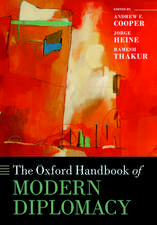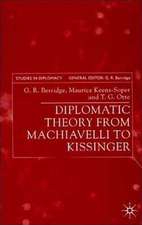Deploying Ourselves: Islamist Violence, Globalization, and the Responsible Projection of U.S. Force
Autor David A. Westbrooken Limba Engleză Paperback – 30 apr 2011
| Toate formatele și edițiile | Preț | Express |
|---|---|---|
| Paperback (1) | 237.27 lei 6-8 săpt. | |
| Taylor & Francis – 30 apr 2011 | 237.27 lei 6-8 săpt. | |
| Hardback (1) | 1541.52 lei 6-8 săpt. | |
| Taylor & Francis – 30 ian 2011 | 1541.52 lei 6-8 săpt. |
Preț: 237.27 lei
Nou
Puncte Express: 356
Preț estimativ în valută:
45.40€ • 47.62$ • 37.80£
45.40€ • 47.62$ • 37.80£
Carte tipărită la comandă
Livrare economică 01-15 aprilie
Preluare comenzi: 021 569.72.76
Specificații
ISBN-13: 9781594517440
ISBN-10: 1594517444
Pagini: 192
Dimensiuni: 138 x 216 x 12 mm
Greutate: 0.27 kg
Ediția:1
Editura: Taylor & Francis
Colecția Routledge
Locul publicării:Oxford, United Kingdom
ISBN-10: 1594517444
Pagini: 192
Dimensiuni: 138 x 216 x 12 mm
Greutate: 0.27 kg
Ediția:1
Editura: Taylor & Francis
Colecția Routledge
Locul publicării:Oxford, United Kingdom
Recenzii
“Excellent. . . . Westbrook is refreshingly direct and realistic. He cuts through so much of the cant surrounding the global war on terror.”
—Andrew Bacevich, Professor of History and International Relations at Boston University and author of The Limits of Power
“Highly readable. Deploying Ourselves builds a persuasive case for extending the classical political framework for the legitimate use of military force to the global polity, leading to sound advice for conducting the war against terrorists. It should be read by concerned citizens as well as responsible government officials.”
—Lt. General (USA, Ret.) Robert G. Gard, Jr., PhD
“This thought-provoking book reflects on the need to re-examine security policy in an increasingly interdependent world, where threats to peace have taken new and ever more dangerous forms. Westbrook offers practical suggestions for a security policy that is smarter about politics in the classical sense of ordering our lives together. Deploying Ourselves is a timely, important work that deserves to be widely discussed.”
—Mary Ann Glendon, Learned Hand Professor of Law, Harvard University, and former U.S. Ambassador to the Holy See
“With the rhetorical power and texture of Tom Paine’s Common Sense, this gripping work of deep intellect, diagnostic acumen, and stunning turns of phrase leads to proposals of reform in the conduct of our foreign, military, and security/intelligence affairs that make radical common sense.”
—George E. Marcus, Chancellor’s Professor of Anthropology, University of California at Irvine, and Member of the American Anthropology Association’s Commission on the Engagement of Anthropology with the U.S. Security and Intelligence Communities
“This book opens up new analytic ground for grappling with some of the most difficult and complex issues of our time. And it gives us pragmatic answers that can take us out of the spirals of current strategy. Westbrook avoids familiar tropes and gives us an original point of view. A great book that should be widely read.”
—Saskia Sassen, Professor of Sociology and Co-Director, Center for Global Thought, Columbia University
“This timely book by David Westbrook makes a powerful case for understanding the U.S. war against Muslim extremism as also and ultimately a political battle for Muslim hearts and minds. His unconventional but persuasive argument, inspired by a realistic rethinking of the arts of both war and statecraft in a global age, should prove a useful counterweight to current tendencies to short-circuit the cultural and diplomatic, not just military, tasks before us.”
—Frank Vogel, Former Director of the Islamic Legal Studies Program, Harvard Law School
“According to Westbrook, the aim of this book is to examine the dilemma the US faces in understanding the political consequences of deploying its armed forces to other countries, including Afghanistan and Iraq…The author correctly explains that many policy makers fail to understand that conducting politics in war is a critical element in implementing policies, but Americans fail to note that the interests of friends and foes must be taken into account…Recommended.” --CHOICE December 2011 Vol. 49 No. 04
—Andrew Bacevich, Professor of History and International Relations at Boston University and author of The Limits of Power
“Highly readable. Deploying Ourselves builds a persuasive case for extending the classical political framework for the legitimate use of military force to the global polity, leading to sound advice for conducting the war against terrorists. It should be read by concerned citizens as well as responsible government officials.”
—Lt. General (USA, Ret.) Robert G. Gard, Jr., PhD
“This thought-provoking book reflects on the need to re-examine security policy in an increasingly interdependent world, where threats to peace have taken new and ever more dangerous forms. Westbrook offers practical suggestions for a security policy that is smarter about politics in the classical sense of ordering our lives together. Deploying Ourselves is a timely, important work that deserves to be widely discussed.”
—Mary Ann Glendon, Learned Hand Professor of Law, Harvard University, and former U.S. Ambassador to the Holy See
“With the rhetorical power and texture of Tom Paine’s Common Sense, this gripping work of deep intellect, diagnostic acumen, and stunning turns of phrase leads to proposals of reform in the conduct of our foreign, military, and security/intelligence affairs that make radical common sense.”
—George E. Marcus, Chancellor’s Professor of Anthropology, University of California at Irvine, and Member of the American Anthropology Association’s Commission on the Engagement of Anthropology with the U.S. Security and Intelligence Communities
“This book opens up new analytic ground for grappling with some of the most difficult and complex issues of our time. And it gives us pragmatic answers that can take us out of the spirals of current strategy. Westbrook avoids familiar tropes and gives us an original point of view. A great book that should be widely read.”
—Saskia Sassen, Professor of Sociology and Co-Director, Center for Global Thought, Columbia University
“This timely book by David Westbrook makes a powerful case for understanding the U.S. war against Muslim extremism as also and ultimately a political battle for Muslim hearts and minds. His unconventional but persuasive argument, inspired by a realistic rethinking of the arts of both war and statecraft in a global age, should prove a useful counterweight to current tendencies to short-circuit the cultural and diplomatic, not just military, tasks before us.”
—Frank Vogel, Former Director of the Islamic Legal Studies Program, Harvard Law School
“According to Westbrook, the aim of this book is to examine the dilemma the US faces in understanding the political consequences of deploying its armed forces to other countries, including Afghanistan and Iraq…The author correctly explains that many policy makers fail to understand that conducting politics in war is a critical element in implementing policies, but Americans fail to note that the interests of friends and foes must be taken into account…Recommended.” --CHOICE December 2011 Vol. 49 No. 04
Cuprins
Part One Introduction; Chapter One Looking Outward; Chapter Two Looking Inward; Chapter Three Overview of the Argument; Part Two Aspects of Engagement; Chapter Four Naming the Enemy; Chapter Five Political Subjects; Chapter Six Politics Is Now; Chapter Seven The Modernism of Radical Neofundamentalism; Chapter Eight All Politics Is Spatial; Part Three The Challenge of Radical Neofundamentalism; Chapter Nine Bin Laden's Challenge; Chapter Ten Ideological Abstraction and Concrete Presence; Chapter Eleven Peacetime Contests; Chapter Twelve Wartime Contests; Part Four Institutional Reform; Chapter Thirteen New World Security; Chapter Fourteen The Department of Foreign Affairs; Chapter Fifteen The Department of Military Operations; Chapter Sixteen The Reintegration of Intelligence; Part Five Conclusion; Chapter Seventeen Against Thucydides;
Descriere
Using a historical approach, puts the case for major reform of US national security institutions to make them more democratically accountable.











